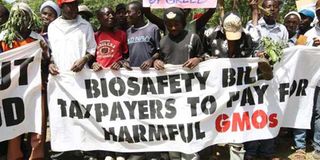Time is not yet ripe to embrace GMOs

Debate on Genetically Modified Organisms (GMO) has generated heat in the country in the last weeks as proponents and opponents advance their arguments. PHOTO | FILE
What you need to know:
- What the public is not being told is that the Bt Maize converts into a “pesticide factory” as every of its cell will be producing the Bt toxin, which has been found to be harmful to non-target organisms that include insects, animals and human beings.
- There are too many unanswered questions with regard to Bt maize to hazard their open field cultivation. Kenya cannot afford to take the leap into the darkness until more light is shed.
- The availability of various varieties will diminish with significant threat to bio-diversity. Maize is cross-pollinated. This means that pollen (male seed) may be brought from another plant, field or farm to the plant which can contaminate and destroy the open pollinated varieties of resilient maize varieties.
Debate on Genetically Modified Organisms (GMO) has generated heat in the country in the last weeks as proponents and opponents advance their arguments.
We would like to add our voice to the subject to further the understanding of GMOs.
Proponents of the technology have fronted Biotechnology (Bt) maize as the panacea to the perennial food challenges we face. However, the truth is Bt maize is not the solution to food insecurity.
They claim that several species of stem borers in Kenya can be controlled, to a varying degree, by presence of the stated bacterial genes in maize. The control indeed has a potential to increase yield by about 50 per cent, all other factors being favourable. There is also the potential reduction in pesticide use in combating the borers, however, the negative effect of the Bt Maize toxin, on non-target organisms is not taken into consideration.
Furthermore, what the public is not being told is that the Bt Maize converts into a “pesticide factory” as every of its cell will be producing the Bt toxin, which has been found to be harmful to non-target organisms that include insects, animals and human beings.
There are a wide range of harmful effects if Kenya allows for the open field cultivation of genetically engineered maize. These are:
i) Bt maize will unfairly take away control of seeds from farmers.
One of the inalienable rights that farmers have is the right to determine what seed to plant. The right include development of their own seeds should they choose to do so. Introduction of the Bt maize would eventually result in surrender of these rights to the patent holder, who would then control national food security. This, in our view, is unacceptable and qualifies as a national security threat.
ii) There are environmental risks associated with open cultivation of Bt maize in Kenya. Genetic contamination will occur once cultivation starts.
The availability of various varieties will diminish with significant threat to bio-diversity. Maize is cross-pollinated. This means that pollen (male seed) may be brought from another plant, field or farm to the plant which can contaminate and destroy the open pollinated varieties of resilient maize varieties. A recent example is the Maize Lethal Necrosis Disease where in some regions farmers have had to resort to traditional open pollinated varieties of maize, apparently resistant to this disease. This option will not be available if we allow for open field cultivation of GMOs.
iii) Will Bt maize be safe for human consumption?
Based on available scientific evidence, it is not safe. Feeding studies on laboratory animals and farm livestock have found that some GM crops, including those already commercialised, have toxic or allergenic effects arising from the crop itself. There is no independent study to prove that GMOs are safe.
We should apply the “precautionary principle” arising from the Cartegena Protocol, of which Kenya is a signatory.
There are too many unanswered questions with regard to Bt maize to hazard their open field cultivation. Kenya cannot afford to take the leap into the darkness until more light is shed. The light requested is longer time animal feeding trials to safeguard the health of the public and environment. We should not toy with the health of the citizens.




